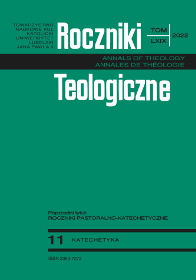How might we apply the trinitarian notion of ‘Person’ to mere humans?
Abstract
The theological concept of ‘person’ and its complementary notion of ‘nature’ were developed through early church teaching on the Holy Trinity and the Incarnation. Persons in this case referred solely to the Father, Son and Holy Spirit while ‘nature’ expressed the unity of the Godhead and encompassed those attributes which were shared by the divine Persons. The later history of this theologically derived notion of ‘person’ took a different turn, moving away from the early complementarity of nature and person in order to embrace the notion of human person for which complementarity seemed ill fitting. In this new conception, ‘person’ was subsumed under the category of ‘nature’. A human person came to refer to the full human reality, body and soul, while a more general notion, aimed at accommodating both divine and human personhood, as famously expressed by Boethius, thought of a person as an individual substance of a rational nature.
One might ask, however, whether it is possible and fruitful to develop the initial, complementary concept of ‘person’ in a different direction, that is, so that it covers not only divine Persons but also mere humans. Does it give a coherence to the area of theological anthropology beyond that afforded by the classical, nature-based concept of ‘person’? Here I attempt to set out a conceptual framework for the application to humans of the concept of ‘person’ as it was developed with the theological controversies of the early Church – or at least according to one reading of that process. I first take note of the features of the theological notion of personhood and test whether human persons might be understood in the same or similar terms, taking into account the difference between divine and creaturely existence. I then draw comparisons with the traditional concept of ‘person’ as it has been applied to human beings to show that the former version is to be preferred. I conclude with comments which draw out some of the implications of this theological notion of person.
References
Baumeister, Roy F., E.J. Masicampo, and C. Nathan DeWall. “Prosocial Benefits of Feeling Free: Disbelief in Free Will Increases Aggression and Reduces Helpfulness.” Personality and Social Psychology Bulletin 35 (2009), 2: 260–268.
Congregation for the Doctrine of the Faith. Donum vitae [The Gift of Life]. Issued 22nd February 1987. https://www.vatican.va/roman_curia/congregations/cfaith/documents/rc_con_cfaith_doc_19870222_respect-for-human-life_en.html.
Denzinger, Heinrich. Compendium of Creeds, Definitions, and Declarations on Matters of Faith and Morals, 43rd ed., ed. Peter Hünermann. San Francisco: Ignatius Press, 2012.
Merker, Bjorn. “Consciousness Without a Cerebral Cortex: A Callenge for Neuroscience and Medicine.” Behavioral and Brain Sciences 30 (2007): 63–134.
Northoff, George, and Jaak Panksepp. “The Trans-Species Concept of Self and the Subcortical-Cortical Midline System.” Trends in Cognitive Sciences 12 (2008): 259–264.
Patterson, Colin. Chalcedonian Personalism: Rethinking the Human. Oxford: Peter Lang, 2016.
Patterson, Colin. “The Holy Trinity: Between Mystery and Analysis.” International Journal of Systematic Theology 20 (2018), 3: 381–401.
Ratzinger, Joseph. “Concerning the Notion of Person in Theology.” Communio 17 (1990): 439-454.
Rigoni, Davide, Simone Kühn, Giuseppe Sartori, and Marcel Brass. “Inducing Disbelief in Free Will Alters Brain Correlates of Preconscious Motor Preparation: The Brain Minds Whether We Believe in Free Will or Not.” Psychological Science 22 (2011), 5: 613–618.
Rigoni, Davide, Gilles Pourtois, and Marcel Brass. “`Why should I care?' Challenging Free Will Attenuates Neural Reaction to Errors.” Social, Cognitive and Affective Neuroscience 10 (2015): 262–268.
Shariff, Azim F., Joshua D. Greene, Johan C. Karremans, Jamie B. Luguri, Cory J. Clark, Jonathan W. Schooler, Roy F. Baumeister, and Kathleen D. Vohs. “Free Will and Punishment: A Mechanistic View of Human Nature Reduces Retribution.” Psychological Science 25 (2014), 8: 1563–1570.
Stillman, Tyler F., Roy F. Baumeister, Kathleen D. Vohs, Nathaniel M. Lambert, Frank D. Fincham, and Lauren E. Brewer. “Personal Philosophy and Personnel Achievement: Belief in Free Will Predicts Better Job Performance.” Social Psychological and Personality Science 1 (2010): 43–50.
Vatican Council II. Gaudium et spes, [The Church in the Modern World]. In Vatican Council II: The Conciliar and Post-Conciliar Documents, Revised Edition, ed. Austin Flannery, 903–1001. New York, NY: Costello, 1988.
Vohs, Kathleen D., and Jonathan W. Schooler. “The Value of Believing in Free Will Encouraging a Belief in Determinism Increases Cheating.” Psychological Science 19 (2008), 1: 49–54.
Ward, Lawrence M. “The Thalamic Dynamic Core Theory of Conscious Experience.” Consciousness and Cognition 20 (2011): 464–486.
Copyright (c) 2022 Roczniki Teologiczne

This work is licensed under a Creative Commons Attribution-NonCommercial-NoDerivatives 4.0 International License.





